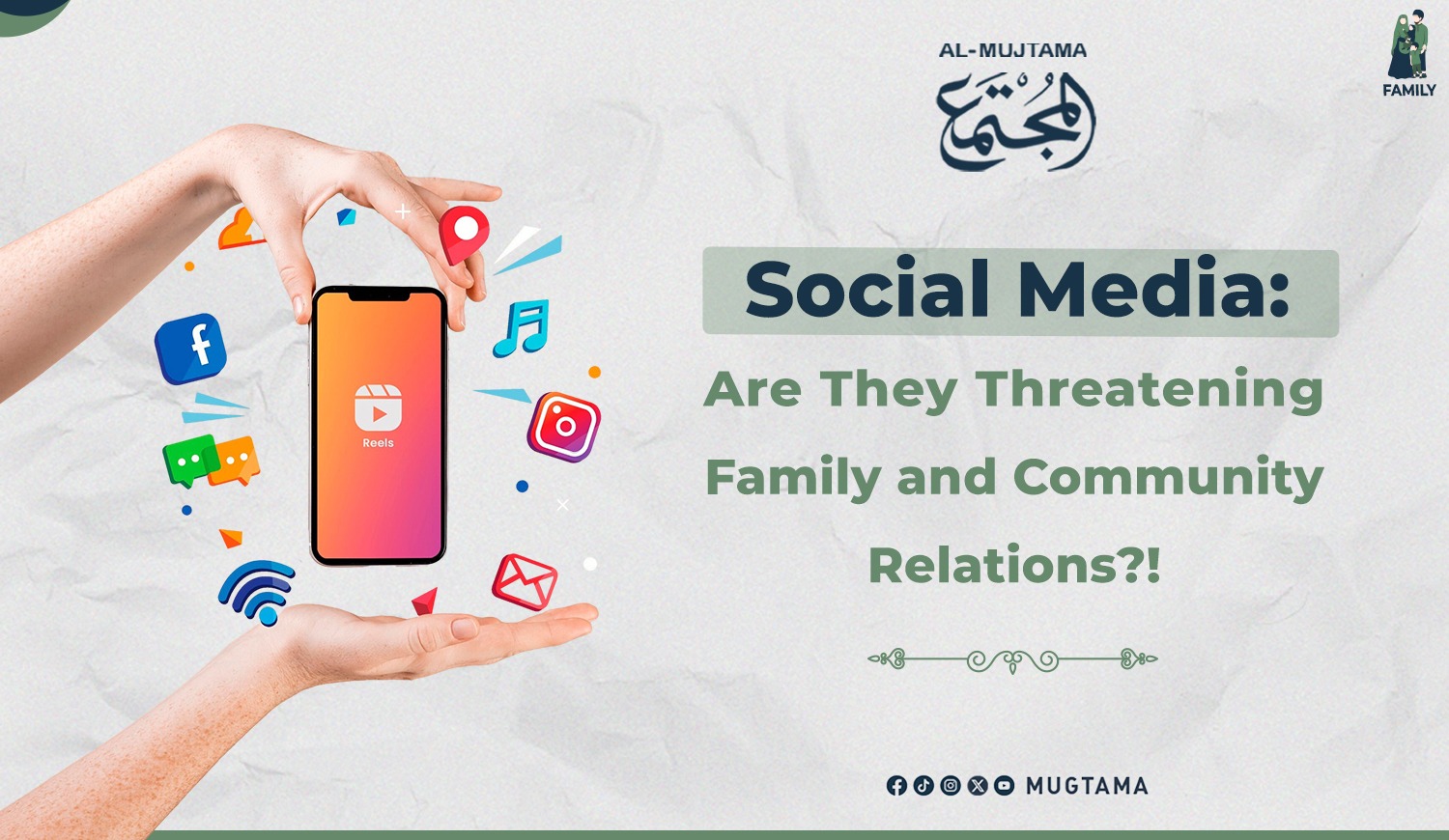Social Media: Are They Threatening Family and Community Relations?!

The debate continues regarding the role social media plays in strengthening or threatening family relationships. Recent studies indicate that the percentage of people who don't spend enough time with their families has reached 54% globally, due to constant engagement with these platforms.
Social media has infiltrated not only families but every individual in society, now threatening relationships between people. Each person enters a virtual world that distances them from real-life communication, leading to ignoring others and strained relations.
The Positives and Negatives
The immense benefits of these platforms cannot be denied. They
bridge distances between families, allow for sharing family discussions,
provide entertainment, open windows to different cultures, foster intellectual
openness, develop knowledge, and facilitate social connection.
However, experts point out that misuse or overuse can lead to negative effects, most notably: weakening family ties, reducing family visits and gatherings, psychological alienation between youth and their society, and sometimes even encouraging behaviors that contradict societal and religious values.
Impact on Family Stability
Specialists affirm that excessive and uncontrolled use of
social media sites can contribute to a decline in family dialogue, a
lack of intimacy, and an increase in divorce rates. Smartphones are now in the
hands of every family member, each with their own private world, which erodes
family relationships and threatens their stability.
Recent studies indicate that the misuse of these platforms has become the primary reason for the increase in divorce cases in Arab courts, due to what is called "digital infidelity" and the ease of engaging in illicit relationships.
Loss of Privacy
Experts also note that sharing details of private life on social media can expose couples to blackmail and comparisons with others, at the expense of healthy marital relationships, which may lead to the disintegration and collapse of family bonds.
Warning Against Slippage
Social specialists warn against immersion in these platforms
to a degree that threatens the fabric of the family and society. They call for
educating individuals through media and social institutions on how to use these
platforms correctly and safely.
----
Al-Mudhaf: Teenagers in Danger, Superficiality is
Not Enough
----
In this context, writer Nada Muhalhal Al-Mudhaf, in an article
in Al-Qabas newspaper, emphasized that social media poses a significant
challenge to family stability, especially in the absence of self-monitoring and
excessive use.
She added that adolescence is the most critical stage in this
regard, as it represents a phase of personality building and value acquisition,
where children are susceptible to many influences that can confuse their
identity and values.
Al-Mudhaf explained that many families are content with
addressing superficial phenomena, such as reducing screen time or confiscating
devices, without paying attention to the deeper aspects of the problem, such as
the absence of family dialogue, or adolescents being exposed to
violence, bullying, harassment, or even being influenced by inappropriate
content.
She added that the family should be a nurturing environment
for its children, by building trust and strengthening positive values and
principles, instead of resorting to punishments or blame. She noted that
adolescents who find psychological and social support within the family are
less likely to drift towards wrong behaviors through social media.
Al-Mudhaf stressed the need for concerted efforts between
schools, social institutions, and the media to educate parents and train them
on how to deal with these modern challenges, emphasizing that prevention begins
at home, through early awareness and constructive dialogue.
-----
Al-Enezi: Disclosing Marital Secrets is a Legal
and Social Risk
-----
For his part, lawyer Mishari Obaid Al-Enezi, on his website,
warned of the danger of disclosing marital or family secrets via social media.
He explained that this phenomenon has become a real threat to the stability and
cohesion of families, especially with the increasing number of divorce cases
reaching courts due to "digital infidelity" or engaging in
illicit relationships.
Al-Enezi pointed out that Kuwaiti law considers the disclosure
of private secrets a punishable crime. Article (232) of the Penal Code
criminalizes the disclosure of entrusted secrets if they cause harm to the
other party, whether material or moral.
He added that publishing private life details on these
platforms can open the door to blackmail, comparisons, or threatening the other
party, which increases the rates of family disputes and divorce.
Al-Enezi explained that social media not only records
situations but can also retain digital evidence that is later used in legal
disputes, whether through text messages, audio recordings, or images, which
increases the seriousness of the matter.
He called for the need to educate spouses and adolescents
about the dangers of unsafe use of these platforms and to raise individuals'
legal literacy to avoid falling into unnecessary problems. He affirmed that
privacy is a right for every individual that must be respected, and any تجاوز (transgression) may expose the perpetrator
to legal accountability and social consequences.
Experts affirm that the strength of societies is measured by
the solidity of the family and the relationships among its members. Therefore,
everyone should cooperate to rectify this situation by rationalizing the use of
social media, enhancing family dialogue, and staying away from negative
use that could lead to disintegration and isolation.










